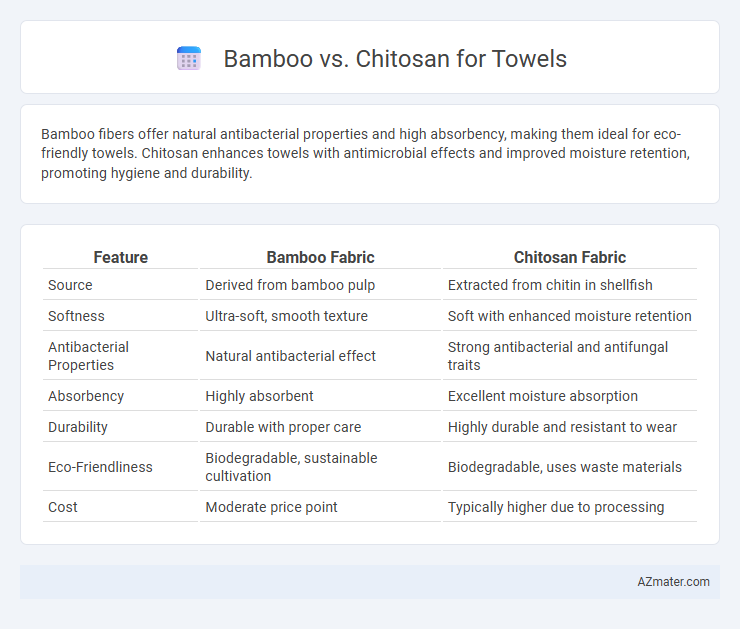Bamboo fibers offer natural antibacterial properties and high absorbency, making them ideal for eco-friendly towels. Chitosan enhances towels with antimicrobial effects and improved moisture retention, promoting hygiene and durability.
Table of Comparison
| Feature | Bamboo Fabric | Chitosan Fabric |
|---|---|---|
| Source | Derived from bamboo pulp | Extracted from chitin in shellfish |
| Softness | Ultra-soft, smooth texture | Soft with enhanced moisture retention |
| Antibacterial Properties | Natural antibacterial effect | Strong antibacterial and antifungal traits |
| Absorbency | Highly absorbent | Excellent moisture absorption |
| Durability | Durable with proper care | Highly durable and resistant to wear |
| Eco-Friendliness | Biodegradable, sustainable cultivation | Biodegradable, uses waste materials |
| Cost | Moderate price point | Typically higher due to processing |
Introduction: Understanding Eco-Friendly Towel Materials
Bamboo and chitosan are innovative materials gaining attention in the eco-friendly towel market due to their sustainable production and natural antimicrobial properties. Bamboo fibers offer high absorbency and softness while requiring fewer pesticides and less water than conventional cotton. Chitosan, derived from crustacean shells, enhances towels with biodegradability and antibacterial benefits, making both materials prime candidates for environmentally conscious consumers.
What Is Bamboo Fiber?
Bamboo fiber is a natural textile material derived from the pulp of bamboo plants, known for its softness, breathability, and moisture-wicking properties, making it ideal for towels. Bamboo fibers possess antibacterial qualities and excellent absorbency, which help reduce odors and keep towels fresh. In comparison, chitosan, a biopolymer extracted from crustacean shells, is often blended with fabrics to enhance antimicrobial properties but lacks the inherent softness and moisture management found in pure bamboo fiber towels.
What Is Chitosan Fiber?
Chitosan fiber, derived from chitin found in crustacean shells, is a natural biopolymer used in towels for its antimicrobial and biodegradable properties. Its molecular structure allows for enhanced moisture absorption and quick drying, making it an eco-friendly alternative to traditional fibers. Compared to bamboo, chitosan towels provide superior odor resistance and durability, ideal for hygienic and sustainable textile applications.
Sustainability and Sourcing: Bamboo vs Chitosan
Bamboo towels are celebrated for their rapid renewability, requiring minimal water and pesticides, making them a highly sustainable resource with environmentally friendly sourcing practices. Chitosan, derived from crustacean shells, utilizes byproducts of the seafood industry, promoting waste reduction but relying on finite marine resources. Both materials support eco-conscious consumers, yet bamboo's faster growth cycle and lower environmental footprint provide stronger sustainability advantages compared to chitosan-based textiles.
Absorbency and Softness Compared
Bamboo towels exhibit superior absorbency due to their natural micro-gaps and moisture-wicking fibers, easily retaining water up to three times their weight. Chitosan-infused towels enhance softness by incorporating biopolymer properties that improve fabric pliability and skin comfort. When comparing both, bamboo excels in moisture absorption, while chitosan treatments significantly boost the tactile softness and durability of towel fibers.
Antimicrobial Properties: Which Material Wins?
Bamboo fibers naturally contain bioagents like bamboo kun, offering strong antimicrobial properties that inhibit bacterial growth and reduce odors in towels. Chitosan, derived from crustacean shells, exhibits superior antimicrobial effectiveness due to its ability to disrupt microbial cell membranes and promote faster drying. While both materials provide significant antimicrobial benefits, chitosan-infused towels often outperform bamboo in durability and sustained bacterial resistance.
Durability and Lifespan of Towel Materials
Bamboo towels exhibit exceptional durability due to their strong natural fibers and moisture-wicking properties, maintaining integrity through multiple washes and resisting wear over time. Chitosan-enhanced towels benefit from antimicrobial properties that reduce fiber degradation and odor retention, extending their functional lifespan. Both materials contribute to long-lasting towels, but bamboo's inherently robust structure generally offers superior durability under frequent use.
Allergen Safety and Skin Sensitivity
Bamboo towels offer hypoallergenic properties due to their natural antimicrobial fibers, making them suitable for sensitive skin and reducing the risk of allergic reactions. Chitosan, derived from crustacean shells, provides antimicrobial benefits but may pose allergen risks for individuals with shellfish allergies. Choosing bamboo towels ensures safer use for allergy-prone and sensitive skin users, while chitosan towels require caution for those with specific allergen sensitivities.
Environmental Impact: Biodegradability and Waste
Bamboo towels offer excellent biodegradability due to bamboo's natural cellulose fibers, breaking down quickly without harming soil or marine ecosystems. Chitosan, derived from crustacean shells, is also biodegradable and enhances antimicrobial properties in towels, reducing the need for chemical treatments. Both materials contribute to reducing textile waste, but bamboo's rapid growth and renewability give it a lower environmental footprint compared to chitosan's reliance on seafood industry byproducts.
Choosing the Right Towel: Bamboo or Chitosan?
Bamboo towels offer exceptional softness, natural antibacterial properties, and superior moisture-wicking capabilities, making them ideal for sensitive skin and everyday use. Chitosan-infused towels enhance durability, provide antimicrobial protection, and promote faster drying, benefiting those seeking long-lasting, hygienic options. Selecting between bamboo and chitosan towels depends on prioritizing softness and eco-friendliness versus enhanced durability and antimicrobial performance.

Infographic: Bamboo vs Chitosan for Towel
 azmater.com
azmater.com